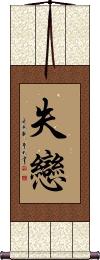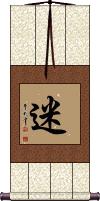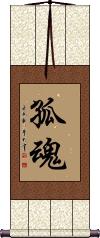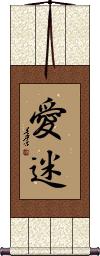Many custom options...
And formats...

Lost in Chinese / Japanese...
Buy a Lost calligraphy wall scroll here!
Personalize your custom “Lost” project by clicking the button next to your favorite “Lost” title below...
2. Mark the boat to find the lost sword / Ignoring the changing circumstances of the world
5. Lost Love
6. Lost Soul
Broken Hearted
In Chinese, this can mean losing one's love; to breaking up (in a romantic relationship); to feel jilted.
In Japanese Kanji, this means disappointing love, broken heart, unrequited love, or being lovelorn.
失戀 is also valid in old Korean Hanja, which means unrequited love, unreturned love, a disappointment in love, or a broken heart.
Note: In modern Japan, they will tend to write the more simple 失恋 form instead of 失戀. If you order this from the Japanese master calligrapher, expect the more simple modern version to be written (unless you give us instructions to use the older or more traditional version).
Mark the boat to find the lost sword / Ignoring the changing circumstances of the world
刻舟求劍 is an originally-Chinese proverb that serves as a warning to people that things are always in a state of change.
Thus, you must consider that and not depend on the old ways or a way that may have worked in the past but is no longer valid.
This idiom/proverb comes from the following story:
A man was traveling in a ferry boat across a river. With him, he carried a treasured sword. Along the way, the man became overwhelmed and intoxicated by the beautiful view and accidentally dropped his prized sword into the river. Thinking quickly, he pulled out a knife and marked on the rail of the boat where exactly he had lost his sword.
When the boat arrived on the other side of the river, the man jumped out of the boat and searched for his sword right under where he'd made the mark. Of course, the boat had moved a great distance since he made the mark, and thus, he could not find the sword.
While this man may seem foolhardy, we must take a great lesson from this parable: Circumstances change, so one should use methods to handle the change. In modern China, this is used in business to mean that one should not depend on old business models for a changing market.
This proverb dates back to the Spring and Autumn period (770–476 BC) of the territory now known as China. It has spread and is somewhat known in Japan and Korea.
Lost / Dazed and Confused
迷 is one of those characters that can mean a lot of different things depending on context. When written alone, as a single character on a wall scroll, it opens up the possibilities and allows you to decide what it means to you.
The key definition is “to be lost.” This could be physically or mentally lost. It can be someone lost in their thoughts, lost in an ocean, or just confused about where they are. The reason for the confused state may be due to internal or external reasons.
Here are some entries from various Asian dictionaries...
Chinese: lost, confused, bewilder, crazy about, fan, enthusiast, mystery.
Japanese: lost, astray, perplexed, in doubt, err, illusion.
Korean: lost, bewildered, fascinated, deluded.
Lonely Soul / Lost Soul
孤魂 is a Chinese title that means “lonely soul.”
In the context of being a soul without a mate or all alone, this can be translated as a “lost soul.”
Lost Love
Lost Soul
These search terms might be related to Lost:
Alone / a Lone Person
Alone / Solitary Existence
Alone With Only Your Shadow for Company
Lost / Dazed and Confused
Missing / Yearning
Not the results for lost that you were looking for?
Below are some entries from our dictionary that may match your lost search...
| Characters If shown, 2nd row is Simp. Chinese |
Pronunciation Romanization |
Simple Dictionary Definition |
迷 see styles |
mí mi2 mi mei |
More info & calligraphy: Lost / Dazed and Confusedmāyā; delude, deceive, confuse, mislead; delusion, illusion, etc. |
愛迷 see styles |
aimei / aime あいめい |
More info & calligraphy: Lost Love |
米爾頓 米尔顿 see styles |
mǐ ěr dùn mi3 er3 dun4 mi erh tun |
More info & calligraphy: Milton |
亡 see styles |
wáng wang2 wang bou / bo ぼう |
to die; to lose; to be gone; to flee; deceased (n,n-suf) (1) (usu. after dates) (See 没・ぼつ・1) death; (prefix) (2) (usu. before names) (See 故・こ) the late; the deceased; (personal name) Suemaru Gone, lost, dead, ruined; not. |
佚 see styles |
yì yi4 i itsu いつ |
lost; missing; forsaken; dissolute; (of a woman) beautiful; fault; offense; hermit; variant of 逸[yi4] being comfortable; relaxing |
失 see styles |
shī shi1 shih shitsu しつ |
to lose; to miss; to fail (1) loss (of something); disadvantage; (2) mistake; error; failure; (3) flaw; defect; (4) (abbreviation) {baseb} (See 失策・2) error To lose, opp. of 得; to err. |
滾 滚 see styles |
gǔn gun3 kun |
to boil; to roll; to take a hike; Get lost! |
不空 see styles |
bù kōng bu4 kong1 pu k`ung pu kung fukuu / fuku ふくう |
(given name, person) Fukuu Amogha, Amoghavajra. 不空三藏; 智藏; 阿目佉跋折羅 Not empty (or not in vain) vajra. The famous head of the Yogācāra school in China. A Singhalese of northern brahmanic descent, having lost his father, he came at the age of 15 with his uncle to 東海, the eastern sea, or China, where in 718 he became a disciple of 金剛智 Vajrabodhi. After the latter's death in 732, and at his wish, Eliot says in 741, he went to India and Ceylon in search of esoteric or tantric writings, and returned in 746, when he baptized the emperor Xuan Tsung. He was especially noted for rain-making and stilling storms. In 749 he received permission to return home, but was stopped by imperial orders when in the south of China. In ?756 under Su Tsung he was recalled to the capital. His time until 771 was spent translating and editing tantric books in 120 volumes, and the Yogacara 密教 rose to its peak of prosperity. He died greatly honoured at 70 years of age, in 774, the twelfth year of Tai Tsung, the third emperor under whom he had served. The festival of feeding the hungry spirits 孟蘭勝會 is attributed to him. His titles of 智藏 and 不空三藏 are Thesaurus of Wisdom and Amogha Tripitaka. |
乱勝 see styles |
midarekachi みだれかち |
(expression) undone victory; upset victory; lost victory |
亡佚 see styles |
wáng yì wang2 yi4 wang i |
nonextant; lost to the ages |
亡羊 see styles |
bouyou / boyo ぼうよう |
lost sheep; (given name) Bouyou |
佚文 see styles |
itsubun いつぶん |
(1) lost work; lost writings; (2) partially lost work; literary fragment; work that survives through quotations; (3) work of a superior quality |
佚書 see styles |
issho いっしょ |
lost book |
六經 六经 see styles |
liù jīng liu4 jing1 liu ching roku kyō |
Six Classics, namely: Book of Songs 詩經|诗经[Shi1 jing1], Book of History 尚書|尚书[Shang4 shu1], Book of Rites 儀禮|仪礼[Yi2 li3], the lost Book of Music 樂經|乐经[Yue4 jing1], Book of Changes 易經|易经[Yi4 jing1], Spring and Autumn Annals 春秋[Chun1 qiu1] six scriptures |
再生 see styles |
zài shēng zai4 sheng1 tsai sheng saisei / saise さいせい |
to be reborn; to regenerate; to be a second so-and-so (famous dead person); recycling; regeneration (n,vs,vt,vi) (1) restoration to life; coming to life again; resuscitation; regeneration; (n,vs,vi) (2) reformation; rehabilitation; (noun, transitive verb) (3) recycling; reclamation; recovery; (noun, transitive verb) (4) playback; regeneration (of video or sound); views (of an online video); (n,vs,vt,vi) (5) {biol} regeneration (of lost or damaged tissue); regrowth; (noun, transitive verb) (6) rebirth; reincarnation; (n,vs,vt,vi) (7) {psych} recall (memory); retrieval |
出神 see styles |
chū shén chu1 shen2 ch`u shen chu shen |
spellbound; entranced; lost in thought |
反撲 反扑 see styles |
fǎn pū fan3 pu1 fan p`u fan pu |
to counterattack; to come back after a defeat; to retrieve lost ground |
古逸 see styles |
gǔ yì gu3 yi4 ku i koitsu |
(text) lost at an early date |
回神 see styles |
huí shén hui2 shen2 hui shen |
to collect one's thoughts (after being surprised or shocked); to snap out of it (after being lost in thought) |
失主 see styles |
shī zhǔ shi1 zhu3 shih chu |
owner of something lost or stolen |
失傳 失传 see styles |
shī chuán shi1 chuan2 shih ch`uan shih chuan |
(of skills etc) to die out; lost; extinct |
失單 失单 see styles |
shī dān shi1 dan1 shih tan |
list of lost or stolen articles |
失地 see styles |
shī dì shi1 di4 shih ti shicchi しっち |
to lose territory; lost territory lost territory |
失注 see styles |
shicchuu / shicchu しっちゅう |
(n,vs,vt,vi) failing to receive an order; losing a sales opportunity; closed lost |
失点 see styles |
shitten しってん |
(1) (ant: 得点) lost point (in a game); point given away; conceded goal; (2) {baseb} run charged to the pitcher; (3) blunder; mistake; error |
失聯 失联 see styles |
shī lián shi1 lian2 shih lien |
to lose contact; to be lost |
失迷 see styles |
shī mí shi1 mi2 shih mi |
to lose one's way; to get lost (on the road etc) |
失道 see styles |
shī dào shi1 dao4 shih tao |
(literary) to lose one's way; to get lost; (literary) to stray from the proper course |
尋獲 寻获 see styles |
xún huò xun2 huo4 hsün huo |
to find; to track down; to recover (something lost) |
廃る see styles |
sutaru すたる |
(v5r,vi) (1) (See 廃れる・すたれる) to go out of use; to become obsolete; to die out; to go out of fashion; (Godan verb with "ru" ending) (2) to become lost (e.g. of dignity); to be sullied |
Click here for more lost results from our dictionary
The following table may be helpful for those studying Chinese or Japanese...
| Title | Characters | Romaji (Romanized Japanese) | Various forms of Romanized Chinese | |
| Broken Hearted | 失戀 失恋 | shitsuren | shī liàn / shi1 lian4 / shi lian / shilian | shih lien / shihlien |
| Mark the boat to find the lost sword Ignoring the changing circumstances of the world | 刻舟求劍 刻舟求剑 | kokushuukyuuken kokushukyuken | kè zhōu qiú jiàn ke4 zhou1 qiu2 jian4 ke zhou qiu jian kezhouqiujian | k`o chou ch`iu chien kochouchiuchien ko chou chiu chien |
| Lost Dazed and Confused | 迷 | mei | mí / mi2 / mi | |
| Lonely Soul Lost Soul | 孤魂 | gū hún / gu1 hun2 / gu hun / guhun | ku hun / kuhun | |
| Lost Love | 愛迷 | ai mei / aimei | ||
| Lost Soul | 喪魂失魄 丧魂失魄 | sàng hún shī pò sang4 hun2 shi1 po4 sang hun shi po sanghunshipo | sang hun shih p`o sanghunshihpo sang hun shih po |
|
| In some entries above you will see that characters have different versions above and below a line. In these cases, the characters above the line are Traditional Chinese, while the ones below are Simplified Chinese. | ||||
Successful Chinese Character and Japanese Kanji calligraphy searches within the last few hours...









